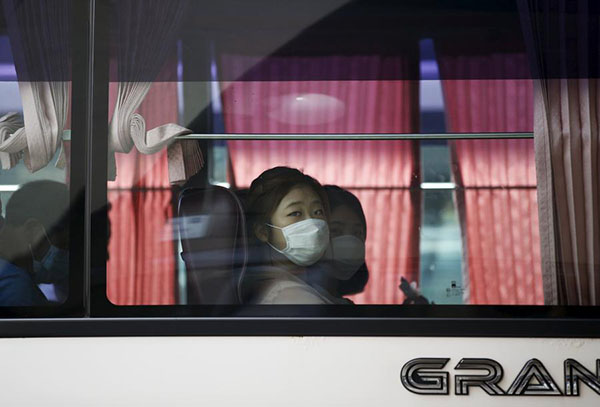Tourists returning to South Korea as MERS shadow starts to fade
By Wang Wen (China Daily) Updated: 2015-07-25 09:25
 |
|
Women wearing masks to prevent contracting Middle East Respiratory Syndrome (MERS) sit inside an express bus in Seoul, South Korea, June 19, 2015. [Photo/Agencies] |
South Korea, one of the popular destinations for Chinese tourists, may see a resurgence in tourism that was badly hit by an outbreak of the Middle East Respiratory Syndrome, thanks to the efforts of two Chinese companies.
Wanda Tourism, a unit of the conglomerate Dalian Wanda Group, and online travel services provider Tongcheng Network Technology Co Ltd on Friday jointly launched a program that will see about 100,000 tourists from China making trips to South Korea within 100 days, starting mid-August.
"We expect the number of Chinese tourists visiting South Korea to recover and reach earlier levels in August," said Xu Daoming, deputy general manager of Wanda Tourism.
In June, at the height of the MERS epidemic in South Korea, the number of visitors from the Chinese mainland fell by nearly 45 percent from the levels seen in June 2014. The number of visitors from Hong Kong declined by 75 percent during the same period, according to Korea National Tourism Organization.
Gao Peng, a 33-year-old Beijing resident, who traveled to South Korea recently for a business trip, said that there were very few tourists in downtown Seoul compared with before.
All the public places provide hand sanitizer and staff keep cleaning the escalator handrails at all shopping malls, Gao said, indicating that the MERS effect is visible everywhere.
"But the situation is much better now than earlier," Gao said. During the worst period, Tongcheng only received single-digit figure bookings for tours to South Korea every day, but the number has since increased to 300 a day this week, said Ma Heping, president of Tongcheng.
Industry sources said tourism to South Korea is recovering fast, as there have been no new confirmed case of MERS for the 18-day period ending July 23, although the country needs another four weeks with no new cases reported to declare an end to the epidemic.
Statistics from Ctrip.com International Inc, the largest online travel agency in China, show that tourism to South Korea has recovered with passenger numbers during the first two weeks of this month showing a 100 percent growth over the same period in June.
"The scare about the MERS epidemic is over and Ctrip is now getting about 100 tour bookings to South Korea every day on average," said a Ctrip manager for South Korea tour products, on condition of anonymity.
Other Chinese travel agencies have also restarted their tourist packages to South Korea, after suspending them due to the MERS scare.
China Comfort Travel Group Co Ltd, a tour operator, said its first tour group with 53 Chinese travelers commenced its tour of South Korea on Wednesday. "We have been providing new tour products tailored for trips to South Korea every day," said Tong Jun, marketing director of the agency.
The current price for a trip to South Korea is 30 to 40 percent lower than the period before the epidemic, she said, with a promotional price of just 2,699 yuan ($434) for each person. The South Korean government and enterprises are also trying their best to attract Chinese tourists, who accounted for 43 percent of the country's total travelers in 2014.
Earlier reports said that South Korea's Ministry of Culture, Sports and Tourism plans to invest 30 billion won ($27 million) on promotional activities aimed at Chinese tourists.
As part of the efforts, Asiana Airlines, an international carrier from South Korea, invited a group of more than 200 Chinese tourism industry professionals to visit the country in July. The airline has also persuaded the government to cut visa fees for Chinese tour groups until Sept 30, said Gao Jing, its marketing manager in China.
- 2015 China International Fair for Investment and Trade kicks off in Xiamen
- China's commodity imports robust in Jan-Aug period
- China stocks rebound 2.92%
- 2015 China box office already past 2014 total
- China foreign trade decline widens in August
- Interview: JP Morgan's senior executive bullish on China
- Innovation, development the focus for NZ mayors
- Lives of freelancers

















